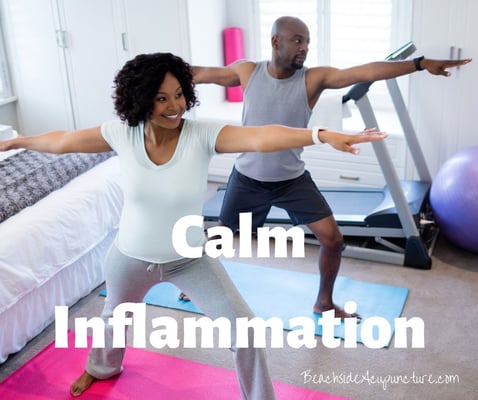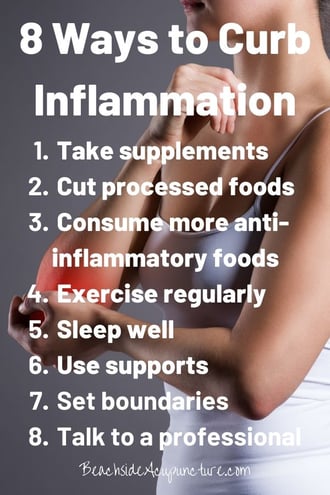
This post contains affiliate links, meaning Beachside Community Acupuncture PLLC may receive a small commission for purchases made through certain links at no additional cost to you. (In other words, you support us in a small way when you buy the products that we highly recommend and would use ourselves!) Click here to view our full disclosure policy.
When you are suffering from a chronic inflammatory condition like joint pain, it may feel like the fires in your body are raging out of control, but there are steps you can take right now that may help you to reduce chronic inflammation, and with it, symptoms such as pain or stiffness in your joints. Below are eight steps to take to decrease chronic inflammation now.
1. Start taking a daily supplement for reducing inflammation.
To give yourself a head start in counteracting high levels of inflammation in your body, try taking a joint support supplement like the highly-rated PRIMAL by Eu Natural. The ingredients in this supplement are backed by scientific research, and include Boswellia Serrata, Celadrin, Turmeric Curcumin, Zinc, Vitamin E, Selenium, Riboflavin and Vitamin D and zero artificial ingredients. To get the full effects, you need to take this supplement every day, and you need to give it time to work. Do not be discouraged if you don’t get instant results. It can take months for full benefits to take effect.
2. Cut inflammatory foods out of your diet.
If your diet is high in omega-6 fatty acids, you may be promoting inflammation with what you eat. The Cleveland Clinic writes, “The American diet is generally higher in omega-6s due to high consumption of processed foods … Sources include corn oil, safflower oil, sunflower oil, peanut oil, grapeseed oil and vegetable oil.” You also should avoid eating sugar or high-fructose corn syrup on an anti-inflammatory diet.
3. Start introducing anti-inflammatory foods.
After you stop eating foods that promote inflammation, try replacing them with those that fight it. Good options include fatty fish, leafy green vegetables, nuts, fruits, and green tea.

4. Begin an exercise routine.
It can be difficult to think of working out when you are in pain—but it might ultimately reduce your pain if you take a gentle approach.
The Mayo Clinic writes, “You don't need to run a marathon or swim as fast as an Olympic competitor to help reduce arthritis symptoms. Even moderate exercise can ease your pain and help you maintain a healthy weight. When arthritis threatens to immobilize you, exercise keeps you moving.”
5. Get regular sleep.
According to the Arthritis Foundation, “Many people blame their restless nights on arthritis pain. But research finds that the relationship actually works both ways – poor sleep can make your joint pain worse, and even increase the likelihood that you may become disabled or depressed.”
How can you manage better sleep when pain keeps you up? The foundation continues, “A restful night’s sleep often starts with developing good sleep hygiene, such as avoiding electronic devices and caffeine, and adhering to a strict bedtime schedule.”
6. Get the support you need.
Depending on which joints are affected, you may need specific forms of support. For example, if you have foot arthritis, the Arthritis Foundation suggests, "Place a small pad just behind the ball of the foot to relieve pressure on the foot. Wear low-heeled shotes with a roomy toe box." For other joints, you might need support from splints from time to time. If the arthritis is in your neck, sleep with a cervical pillow that maintains the curve of your spine.
7. Set Limits
Every day, people ask things of us. Our family and friends might ask us to make commitments, or our boss might try to saddle us with extra assignments. These requests are often made without any empathy for your situation, even when well-intended. There are some requests you can’t really say “no” to if you want to keep a job or a relationship. But a lot of us say “yes” automatically even to things we can or should say “no” to.
Start learning how to say “no” and set firm limits for yourself. You don’t have bottomless energy every day, and your chronic pain will get worse when you are stressed. By setting limits and demanding that others respect them (and learning to respect them yourself), you can alleviate stress and give your body and mind the rest they need to recover. If you need help explaining to others, try evoking the popular “spoons” metaphor to describe your limitations.
8. Use Medications If You Need Them
If you haven’t yet seen a rheumatologist about your condition, think about doing so. A specialist may be able to prescribe you medications that could significantly reduce your inflammation and increase your quality of life.

Be patient, as results can be gradual. It can take weeks to start noticing improvements in your pain condition as you battle inflammation, and months before improvements become more dramatic. But if you are patient and stick with your lifestyle changes, hopefully you will see a reduction in stiffness and pain.
Note from Beachside: Almost everything you can do to promote overall health will also decrease chronic inflammation. Whether you're stuck at home or engaging in your usual routines, there are always lifestyle adjustments that you can make to improve your well-being. Earthing, acupressure, meditation... Many healthy habits are free and simple for you to start practicing!

This post was written through the coordination of Andrea Tanada at Eu Natural, a company dedicated to quality, health, and philanthropy. Check out their Instagram and Facebook accounts for more information., and for a complete list of supplements, visit their website EuNatural.com.










Write a comment